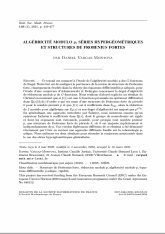Algébricité modulo $p$, séries hypergéométriques et structures de Frobenius fortes
Algebraicity modulo $p$, hypergeometric series and strong Frobenius structure

- Consulter un extrait
- Année : 2021
- Fascicule : 3
- Tome : 149
- Format : Électronique
- Langue de l'ouvrage :
Français - Class. Math. : 11E95, 12H25
- Pages : 439-477
- DOI : 10.24033/bsmf.2834
Ce travail est consacré à l'étude de l'algébricité modulo $p$ des $G$-fonctions de Siegel. Notre but est de souligner la pertinence de la notion de structure de Frobenius forte, classiquement étudiée dans la théorie des équations différentielles $p$-adiques, pour l'étude d'une conjecture d'Adamczewski et Delaygue concernant le degré d'algéricité de réductions modulo $p$ de $G$-fonctions. Nous rendons d'abord explicite un résultat de Christol en montrant que si $f(z)$ est une $G$-fonction qui annule un opérateur différentiel dans $\mathbb{Q}(z)[d/dz]$ d'ordre $n$ qui est muni d'une structure de Frobenius forte de période $h$ pour le nombre premier $p$ et que $f(z)$ est à coefficients dans $\mathbb{Z}_{(p)}$, alors la réduction de $f$ modulo $p$ est algébrique sur $\mathbb F_p(z)$ et son degré d'algébricité est majoré par $p^{n^2h}$. En généralisant une approche introduite par Salinier, nous montrons ensuite qu'un opérateur fuchsien à coefficients dans $\mathbb{Q}(z)$, dont le groupe de monodromie est rigide et dont les exposants sont rationnels, possède, pour presque tout nombre premier $p$, une structure de Frobenius forte de période $h$, où $h$ est majorée explicitement et indépendamment de $p$. Une version légèrement différente de ce résultat a été démontré récemment par Crew en suivant une approche différente fondée sur la cohomologie $p$-adique. Nous utilisons ces deux résultats pour résoudre la conjecture mentionnée dans le cas des séries hypergéométriques généralisées.

